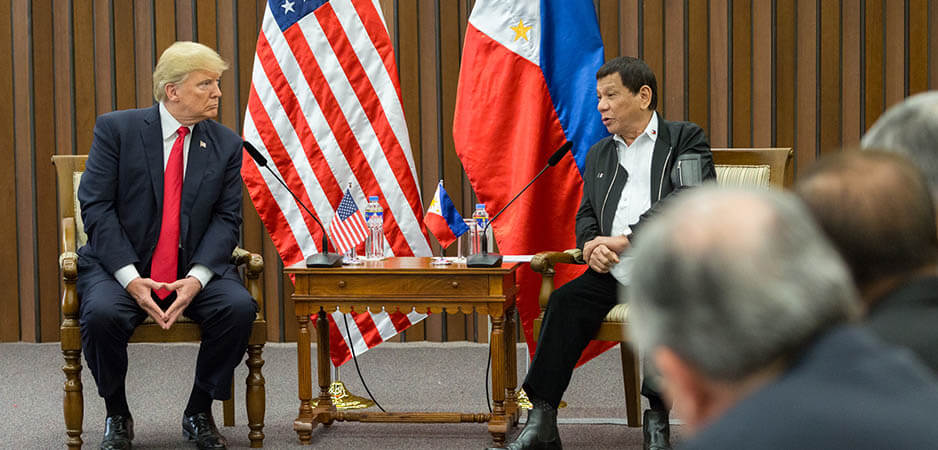The Philippines provides one example among many others across the globe of a crisis of confidence in democratic elections and processes.
The midterm elections in the Philippines have produced a result most casual foreign observers were not expecting. The controversial populist president, Rodrigo Duterte — who may still be charged by the International Criminal Court (ICC) with crimes against humanity — has not only consolidated his majority in both the House of Representatives and the Senate, but has seen his personal approval rating soar.
Al Jazeera identifies a specific cause for Duterte’s success, which may apply to other nations as well: “Duterte’s persistently high popularity is very much a reflection of society-wide attitudes. Fed up with decades of gridlock in government and poor public services, a palpable ‘democracy fatigue’ has taken hold of the majority of Filipinos.”
Here is today’s 3D definition:
Democracy fatigue:
A physical disorder that affects people who have been told for decades to trust the politicians they vote for in elections. The disorder sets in as soon as the voters begin to realize that those they have elected to represent them constitute a club of powermongers, whose main skill is to collectively and collaboratively hide all traces of accountability for policies designed principally to reinforce the power of the club and the comfort of its members.
Contextual note
The disorder has been spreading across the globe in recent years and has contributed powerfully to turning the entire notion of democratic politics into pure hyperreality. Another obvious case is Ukraine, which inaugurated its new president this week, Volodymyr Zelenskiy, a man whose sole link with politics was playing the role of a president on television. In other words, he was a media creation.
To some extent, that is also true of Emmanuel Macron in France. Zelenskiy is following his example by creating a new party, Servant of the People, in an attempt to duplicate President Macron’s successful elimination of the two major political formations on the right and the left that had alternated or shared power since the dawn of the Fifth Republic. Zelenskiy has also taken the constitutionally dubious step in Ukraine of imitating the constitutionally legitimate practice in France of calling for legislative elections in the immediate aftermath of the presidential election.
Zelenskiy is promising to take much bolder action than Macron when he declares that he is “not afraid to make tough decisions, lose my popularity, my ratings.” In that he appears to be closer to President Duterte, who took similar risks, acting frequently like a murderous dictator, only to see his approval ratings rise over time. In 2017, this author interviewed an opposition leader, Antonio Trillanes IV, who, after registering the formal complaint for crimes against humanity at the ICC, calmly predicted that Duterte’s popularity would rapidly wane.
Then there are the very special cases of Brexit and Donald Trump’s election in 2016. Aren’t they also, in some sense, the result of democracy fatigue? And what about India?
But has democracy ever been truly functional in the modern world? We should ask ourselves an even more fundamental question: When the function of democracy is reduced to holding elections at regular intervals and then letting the ruling class govern, can we really expect governments of the people, by the people and for the people?
Historical note
The tradition of electing media creations as political leaders dates back at least to Hollywood actor Ronald Reagan’s election to the presidency of the United States in 1980. But unlike the recent trend that includes Trump, Duterte and Zelenskiy, Reagan was more the figurehead of the Republican Party than an unpredictable free electron using his media image to challenge the bureaucracy of all traditional political parties.
The rise of populists such as Duterte in the Philippines, Victor Orban in Hungary, Jair Bolsonaro in Brazil and Vladimir Putin in Russia — to say nothing of Trump in the US — follows a telltale pattern that emerged, perhaps inevitably, after the official end of the Cold War and the simultaneous transition in China from Maoism to socialist market capitalism.
 We could call this the decline of ideology as the basis for political activism. For at least half a century following the Russian Revolution, geopolitics and, in some cases, national politics were dominated by the principle of ideological orientation. Historians would be justified in calling the 20th century an era of “isms.” This was true even in the arts and sciences, with fauvism, expressionism, constructivism, modernism, etc. In the political realm, communism and fascism held center stage between the two world wars.
We could call this the decline of ideology as the basis for political activism. For at least half a century following the Russian Revolution, geopolitics and, in some cases, national politics were dominated by the principle of ideological orientation. Historians would be justified in calling the 20th century an era of “isms.” This was true even in the arts and sciences, with fauvism, expressionism, constructivism, modernism, etc. In the political realm, communism and fascism held center stage between the two world wars.
At the most extreme and dramatic moments, during the Cold War, Soviet communism was in a military, psychological and rhetorical struggle with American capitalism. The public on both sides of the Iron Curtain, and especially in the US, accepted the aberrant idea that their national destiny was identified with something proposed to be the equivalent of a philosophy.
But both capitalism and communism merely represented two types of economic organization, with each evolving into a complex, legally defined system to regulate exchange and the attribution of property. Both claimed to be founded on moral principles while engaging in fundamentally amoral power politics. They could be thought of as philosophies to the extent that the power structures designed to regulate them had the rhetorical means to convince their respective populations that their key organizing principles were the logical consequences of a moral system, not a matter of political choice.
The pretension of a society based on a set of coherent, morally justified choices no longer appears to be politically operative. The dawning realization that our societies — whether clinging to democratic ideals or sacrificing them to the temptation of bold decision-making by populist leaders — are effectively controlled and regulated by oligarchies has led to the democracy fatigue that now seems to affect every region of the world where leaders and parliaments are elected.
*[In the age of Oscar Wilde and Mark Twain, another American wit, the journalist Ambrose Bierce, produced a series of satirical definitions of commonly used terms, throwing light on their hidden meanings in real discourse. Bierce eventually collected and published them as a book, The Devil’s Dictionary, in 1911. We have shamelessly appropriated his title in the interest of continuing his wholesome pedagogical effort to enlighten generations of readers of the news.]
The views expressed in this article are the author’s own and do not necessarily reflect Fair Observer’s editorial policy.
Support Fair Observer
We rely on your support for our independence, diversity and quality.
For more than 10 years, Fair Observer has been free, fair and independent. No billionaire owns us, no advertisers control us. We are a reader-supported nonprofit. Unlike many other publications, we keep our content free for readers regardless of where they live or whether they can afford to pay. We have no paywalls and no ads.
In the post-truth era of fake news, echo chambers and filter bubbles, we publish a plurality of perspectives from around the world. Anyone can publish with us, but everyone goes through a rigorous editorial process. So, you get fact-checked, well-reasoned content instead of noise.
We publish 2,500+ voices from 90+ countries. We also conduct education and training programs
on subjects ranging from digital media and journalism to writing and critical thinking. This
doesn’t come cheap. Servers, editors, trainers and web developers cost
money.
Please consider supporting us on a regular basis as a recurring donor or a
sustaining member.
Will you support FO’s journalism?
We rely on your support for our independence, diversity and quality.






